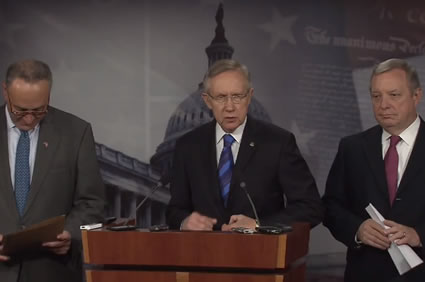The six Democrats and six Republicans on the “Super  Committee,” which is officially called the Joint Select Committee on Deficit Reduction, have conceded that they cannot agree on an alternative to the $1.2 trillion in deficit reduction that will occur automatically under existing law.
Committee,” which is officially called the Joint Select Committee on Deficit Reduction, have conceded that they cannot agree on an alternative to the $1.2 trillion in deficit reduction that will occur automatically under existing law.
As the result of this summer’s deficit standoff, Congress and the President agreed to these automatic cuts, to take effect starting in 2013, if the Super Committee was unsuccessful in forging a deficit reduction plan that both parties in Congress could support.
For months, Republicans and Democrats have gone through cycles of offering plans that they claimed would reduce the budget deficit, but which would actually increase the deficit by extending all or most of the tax cuts first enacted under President George W. Bush and which are currently scheduled to expire at the end of 2012.
Even if the Super Committee did come up with a way to reduce spending or raise revenue by $1.2 trillion or $3 trillion or $4 trillion, it would make little sense if coupled with an agreement to extend tax cuts that cost even more than this, particularly when those tax cuts are heavily aimed at the rich.
The Democrats have not always presented a coherent view on this point. The plan released by President Obama in September would cut taxes far more than it would raise them. As we said back then:
The tables in the back of the President’s 80-page plan quietly remind us that the total cost of making permanent the Bush tax cuts would be $3.867 trillion over the next ten years, but the President says he will “raise revenue” by making permanent “only” $3.001 trillion of these tax cuts. We certainly applaud the President for refusing to extend the $866 billion of these tax cuts that would go exclusively to those with adjusted gross incomes in excess of $250,000, but it’s difficult to call this deficit reduction.
Setting aside the $866 billion that the President proposes to “raise” by not extending that part of the Bush tax cuts, the net effect of the other tax provisions in the plan (excluding the parts used to help pay for his proposed new jobs provisions) is to raise only $259 billion over the next decade. That means that, overall, the President is proposing more than $2.7 trillion in deficit-increasing tax cuts through fiscal 2021! The cost of these tax cuts is even greater when accounting for the additional interest payments on the national debt that will result.
 And just to set the record straight, the cost of the Bush tax cuts is actually larger than that. The administration’s cost figures were based on a budget window that begins in 2012, when the Bush tax cuts are already in effect and thus have no cost.
And just to set the record straight, the cost of the Bush tax cuts is actually larger than that. The administration’s cost figures were based on a budget window that begins in 2012, when the Bush tax cuts are already in effect and thus have no cost.
If extended through 2013 and beyond, these tax cuts would cost $4.4 trillion over the 2013-2022 period ($5.4 trillion counting the additional interest payments that will result because of the increase in the national debt). Almost half of these tax cuts would go to the richest 5 percent of taxpayers, and only about six percent of these tax cuts would go to the bottom 40 percent of taxpayers.
The last proposal offered by the Democrats on the Super Committee, according to media reports, would have raised an outrageously low $400 billion in revenue over ten years but would have left the question of the expiring Bush tax cuts for another day. This was something the Republicans on the committee could not accept.
Last year, Congressional Republicans demonstrated that they would not accept any bill that extended most, but not all, of the Bush tax cuts. During the Super Committee negotiations they appeared willing to raise a few hundred billion dollars by closing tax loopholes that mainly benefit working class Americans if they could make permanent and even expand the Bush tax cuts at a cost of over $4 trillion. Now they seem to be signaling that they will not accept any bill that is supposed to reduce the deficit unless it actually increases the deficit by extending the Bush tax cuts.
Both parties have tied themselves into knots over taxes that they will find difficult to untangle, but that matters little because if Congress simply does nothing (and that, frankly, is one thing it excels at) the Bush tax cuts will expire at the end of 2012 and one of the greatest causes of the budget deficit will be behind us.
We would like to think that Congress can now step away from its obsession with deficit-reduction plans that actually increase the deficit and turn its attention to the most pressing concern Americans have right now: jobs.
There is ample evidence that the Bush tax cuts have failed miserably to help the economy in the ways promised by their proponents. It’s time for Congress to focus on job creation measures that do not involve tax cuts for the rich.
![]()
 The one-fifth of one percent of taxpayers affected by the Senate Democrats’ proposed millionaire surcharge would pay 2.1 percent of their incomes in higher taxes, on average, under the proposal.
The one-fifth of one percent of taxpayers affected by the Senate Democrats’ proposed millionaire surcharge would pay 2.1 percent of their incomes in higher taxes, on average, under the proposal.



 Government spending measures are the best way to reduce unemployment, but if lawmakers insist on using tax policy instead, they should revive the Making Work Pay Credit, as some Senators have discussed recently.
Government spending measures are the best way to reduce unemployment, but if lawmakers insist on using tax policy instead, they should revive the Making Work Pay Credit, as some Senators have discussed recently. Committee,” which is officially called the Joint Select Committee on Deficit Reduction, have conceded that they cannot agree on an alternative to the $1.2 trillion in deficit reduction that will occur automatically under existing law.
Committee,” which is officially called the Joint Select Committee on Deficit Reduction, have conceded that they cannot agree on an alternative to the $1.2 trillion in deficit reduction that will occur automatically under existing law.  And just to set the record straight, the cost of the Bush tax cuts is actually larger than that. The administration’s cost figures were based on a budget window that begins in 2012, when the Bush tax cuts are already in effect and thus have no cost.
And just to set the record straight, the cost of the Bush tax cuts is actually larger than that. The administration’s cost figures were based on a budget window that begins in 2012, when the Bush tax cuts are already in effect and thus have no cost. A new CTJ report shows that only 0.3 percent of deaths in the U.S. in 2009 resulted in federal estate tax liability. This provides a rough approximation of the impact that President Obama’s estate tax proposal would have, because the estate tax rules in effect in 2009 are the same rules that President Obama has proposed to make permanent. A more sensible alternative is the estate tax proposal announced yesterday by Congressman Jim McDermott.
A new CTJ report shows that only 0.3 percent of deaths in the U.S. in 2009 resulted in federal estate tax liability. This provides a rough approximation of the impact that President Obama’s estate tax proposal would have, because the estate tax rules in effect in 2009 are the same rules that President Obama has proposed to make permanent. A more sensible alternative is the estate tax proposal announced yesterday by Congressman Jim McDermott. the country. No other state asks more of its poorest taxpayers and simultaneously asks so little of its wealthiest taxpayers. The major reasons for its distorted tax structure are the state’s excessive reliance on sales taxes (along with property taxes) and the absence of any type of tax on income.
the country. No other state asks more of its poorest taxpayers and simultaneously asks so little of its wealthiest taxpayers. The major reasons for its distorted tax structure are the state’s excessive reliance on sales taxes (along with property taxes) and the absence of any type of tax on income. on November 8, estimated the budget hole from eliminating these two vital sources of revenue would equal
on November 8, estimated the budget hole from eliminating these two vital sources of revenue would equal  story echoes a recent
story echoes a recent  earlier this year when he broke with right-wing ideologues by suggesting that Congress could raise some amount of revenue greater than zero dollars, has issued a
earlier this year when he broke with right-wing ideologues by suggesting that Congress could raise some amount of revenue greater than zero dollars, has issued a  amendment considered today was the less extreme of the two versions that have been discussed lately. The version supported by anti-tax activist Grover Norquist would require approval by two-thirds of both chambers of Congress to pass any revenue increase, ensuring that efforts to balance the budget during recessions would definitely be done entirely through spending cuts and have the effects described above. Of course, the fact that a proposal is slightly less extreme than the one preferred by Grover Norquist is no indication that it’s a great idea.
amendment considered today was the less extreme of the two versions that have been discussed lately. The version supported by anti-tax activist Grover Norquist would require approval by two-thirds of both chambers of Congress to pass any revenue increase, ensuring that efforts to balance the budget during recessions would definitely be done entirely through spending cuts and have the effects described above. Of course, the fact that a proposal is slightly less extreme than the one preferred by Grover Norquist is no indication that it’s a great idea.